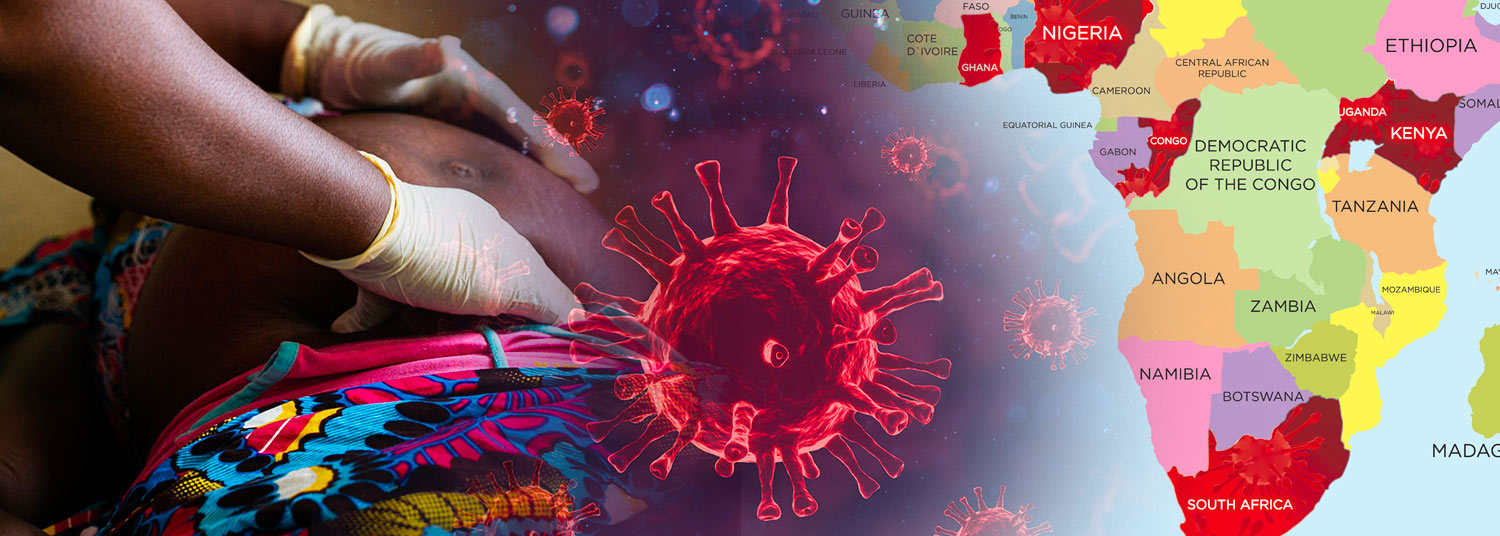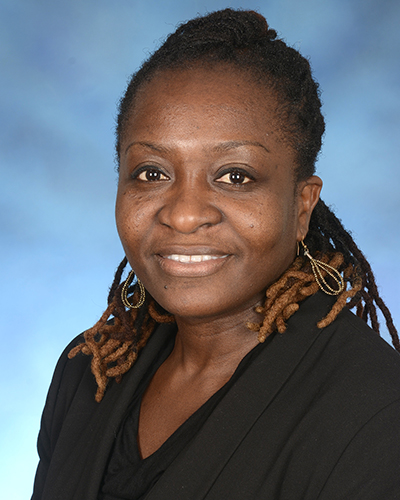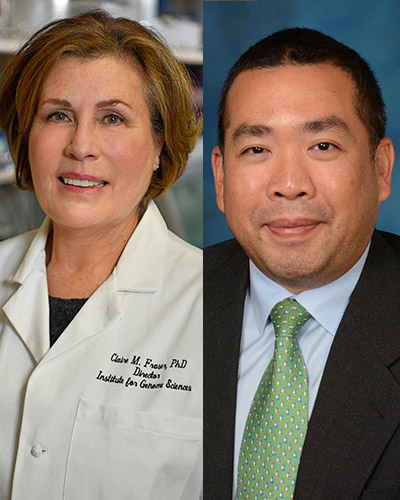July 19, 2022 | Vanessa McMains

A new study involving hospitalized women in six African countries from the University of Maryland School of Medicine’s (UMSOM) Institute of Human Virology (IHV) showed that pregnant women with SARS-CoV-2, the virus that causes COVID-19, had double the risk of being admitted to the intensive care unit (ICU) and four-times the risk of dying in-hospital than pregnant women who did not have COVID-19.
 The researchers stated that their findings suggest that women who are pregnant or may become pregnant should avoid getting COVID-19 and protect themselves as best as they can with available vaccines.
The researchers stated that their findings suggest that women who are pregnant or may become pregnant should avoid getting COVID-19 and protect themselves as best as they can with available vaccines.
The findings were published on June 8, 2022, in the Clinical Infectious Diseases journal, along with an accompanying viewpoint.
“If the mother does not do well, then the baby does not do well either. As we do not yet have vaccines for babies less than six months old, pregnant women should get the vaccine to protect their unborn children and newborns,” said Nadia Sam-Agudu, MD, Associate Professor of Pediatrics at UMSOM, Senior Technical Advisor for Pediatric and Adolescent HIV at the UMSOM’s Institute of Human Virology, and International Senior Technical Advisor of Pediatric and Adolescent HIV at the Institute of Human Virology Nigeria.
Dr. Sam-Agudu added that currently available evidence shows that COVID-19 vaccines indicated for use in pregnancy are safe, and emerging data show that they provide protection for newborns as well as mothers.
The new study was conducted by the African Forum for Research and Education in Health (AFREhealth) Research Collaboration on COVID-19 and Pregnancy. The study examined data on 1,315 women hospitalized in Ghana, Nigeria, Democratic Republic of the Congo, Uganda, Kenya, and South Africa, including 510 pregnant women with COVID-19, 403 non-pregnant women with COVID-19, and 402 pregnant women without COVID-19.
Women with other risk factors such as diabetes, HIV, history of tuberculosis, or sickle cell disease were at greater risk for severe COVID-19. About 32% of pregnant women with COVID-19 needed in-hospital oxygen therapy compared to 16% of pregnant women without COVID-19. Some 19% of pregnant women with COVID-19 were admitted to the ICU, compared to 6% of pregnant women who did not have COVID-19. Among the women hospitalized with COVID-19, 10% of those who were pregnant died compared to the 5% that were not pregnant.
 “I would like to appeal to healthcare providers to consider the data with respect to vaccine safety for pregnant women, and to counsel women to help them consider the vaccine in light of the consequences of COVID-19,” said Dr. Sam-Agudu. “Knowing that we have tools to prevent this disease from progressing, we should be more intentional, educational, and supportive about vaccination in pregnancy, so that pregnant women or women who plan to become pregnant can access and receive vaccines.”
“I would like to appeal to healthcare providers to consider the data with respect to vaccine safety for pregnant women, and to counsel women to help them consider the vaccine in light of the consequences of COVID-19,” said Dr. Sam-Agudu. “Knowing that we have tools to prevent this disease from progressing, we should be more intentional, educational, and supportive about vaccination in pregnancy, so that pregnant women or women who plan to become pregnant can access and receive vaccines.”
Overall, COVID-19 vaccination rates remain much lower in Africa compared to much of the rest of the world. As of today, with the exception of a few, full vaccination rates in African countries do not top 40%. According to the researchers, COVID-19 vaccination rates are likely to be much lower among pregnant women in these settings.
African countries still contend with low and inconsistent COVID-19 vaccine supplies, largely due to persistent inequity in access to global vaccine supply and manufacturing. Experts remain concerned that vaccine demand and acceptance may wane, and vaccine apathy may set in, as inconsistent access and supply persist.
 “This study furthers confirms that pregnant women face special risks and potential complications from COVID-19,” said Man Charurat, PhD, MHS, Professor of Medicine at UMSOM and the Division Director of Epidemiology & Prevention at UMSOM’s Institute of Human Virology. “Public health experts and physicians need to make more effort to solve the problem of vaccine inequity in Africa.”
“This study furthers confirms that pregnant women face special risks and potential complications from COVID-19,” said Man Charurat, PhD, MHS, Professor of Medicine at UMSOM and the Division Director of Epidemiology & Prevention at UMSOM’s Institute of Human Virology. “Public health experts and physicians need to make more effort to solve the problem of vaccine inequity in Africa.”
E. Albert Reece, MD, PhD, MBA, Executive Vice President for Medical Affairs, University of Maryland Baltimore, and the John Z. and Akiko K. Bowers Distinguished Professor and Dean, UMSOM, said, “We need to make every effort to ensure that all countries or regions have available access to resources such as COVID-19 vaccines to prevent any unnecessary suffering. It is imperative that we encourage pregnant women to use the tools we now have developed to prevent their own disability and promote healthy births.”
This work was supported by the U.S. National Institutes of Health (NIH) Fogarty International Center (1R25TW011217-01) to AFREhealth.
About the Institute of Human Virology
Formed in 1996 as a partnership between the State of Maryland, the City of Baltimore, the University System of Maryland, and the University of Maryland Medical System, the IHV is an institute of the University of Maryland School of Medicine and is home to some of the most globally-recognized and world-renowned experts in all of virology. The IHV combines the disciplines of basic research, epidemiology, and clinical research in a concerted effort to speed the discovery of diagnostics and therapeutics for a wide variety of chronic and deadly viral and immune disorders, most notably HIV, the virus that causes AIDS. For more information, visit ihv.org and follow us on Twitter @IHVmaryland.
About the University of Maryland School of Medicine
Now in its third century, the University of Maryland School of Medicine was chartered in 1807 as the first public medical school in the United States. It continues today as one of the fastest growing, top-tier biomedical research enterprises in the world -- with 46 academic departments, centers, institutes, and programs, and a faculty of more than 3,000 physicians, scientists, and allied health professionals, including members of the National Academy of Medicine and the National Academy of Sciences, and a distinguished two-time winner of the Albert E. Lasker Award in Medical Research. With an operating budget of more than $1.3 billion, the School of Medicine works closely in partnership with the University of Maryland Medical Center and Medical System to provide research-intensive, academic, and clinically based care for nearly 2 million patients each year. The School of Medicine has nearly $600 million in extramural funding, with most of its academic departments highly ranked among all medical schools in the nation in research funding. As one of the seven professional schools that make up the University of Maryland, Baltimore campus, the School of Medicine has a total population of nearly 9,000 faculty and staff, including 2,500 students, trainees, residents, and fellows. The combined School of Medicine and Medical System (“University of Maryland Medicine”) has an annual budget of over $6 billion and an economic impact of nearly $20 billion on the state and local community. The School of Medicine, which ranks as the 8th highest among public medical schools in research productivity (according to the Association of American Medical Colleges profile) is an innovator in translational medicine, with 606 active patents and 52 start-up companies. In the latest U.S. News & World Report ranking of the Best Medical Schools, published in 2021, the UM School of Medicine is ranked #9 among the 92 public medical schools in the U.S., and in the top 15 percent (#27) of all 192 public and private U.S. medical schools. The School of Medicine works locally, nationally, and globally, with research and treatment facilities in 36 countries around the world. Visit medschool.umaryland.edu
Contact
Vanessa McMains
Director, Media & Public Affairs
University of Maryland School of Medicine
Institute of Human Virology
vmcmains@ihv.umaryland.edu
Cell: 443-875-6099
Related stories

Monday, October 17, 2022
Quartz: The Africa CDC Chief Had Trouble Getting into Germany for the World Health Summit
Attendees from poor countries often struggle to get visas to attend the conferences that discuss their future. The World Health Summit, a World Health Organization (WHO)-backed global health conference, is underway in Berlin, Germany. Ahmed Ogwell Ouma (who goes by Ahmed Ogwell), the acting director of Africa’s Centers for Disease Control and Prevention (Africa CDC), almost didn’t make it to Berlin. At Frankfurt airport, he noted on Twitter, he was “mistreated.. by immigration personnel who imagine I want to stay back illegally.”

Thursday, June 23, 2022
New Research Shows Mothers’ HIV Status, Breastfeeding, and the Infant Gut Microbiome Can Have Long-Term Impact on Infant Health
Babies born to women with HIV often have poorer health and under-developed growth in the early months of life than infants born to women without the infection — even if those babies don’t contract HIV during birth, according to a new study by researchers at the University of Maryland School of Medicine (UMSOM)’s Institute for Genome Sciences (IGS) and Institute of Human Virology (IHV). The study also provides new insights into why these health issues often continue throughout the babies’ lives.

Wednesday, May 25, 2022
NIH Awards Grant to Train Global Health Scientists in Low-and-Middle-Income Countries
Researchers at the University of Maryland School of Medicine (UMSOM) received a $5.5 million award from the National Institute of Health’s Fogarty International Center to help foster the next generation of global health scientists. The award entitled, “Integrated Network of Scholars in Global Health Research Training (INSIGHT)” will expand global health research across sub-Saharan Africa, South Asia, Latin America, and the Caribbean by providing one-year mentored research training to U.S. and lower-middle income country scholars.

Friday, May 20, 2022
NIH Grant Awarded to Study HIV Drug-Resistant Genetic Mutations Across Africa
University of Maryland School of Medicine (UMSOM)’s Institute of Human Virology (IHV) researchers received funding from the National Institutes of Health’s National Institute of Allergy and Infectious Diseases (NIAID) for $2.7 million to study genetic changes in two genes from the HIV-1 virus that may make it resistant to antiretroviral therapy. The study, named INSPIRE, will analyze genetic variation in types of HIV circulating in a handful of African countries that will help to better understand the implications of these mutations and will improve clinical management of patients.

Monday, May 09, 2022
Quartz: The cause of the next pandemic is probably already here
A bird flu is spreading again. Several cases of very contagious avian influenza have been identified in the states of Washington, Oregon, Maryland, and Delaware, where over 3 million cases in chickens have been identified since February. At least 80 vultures, too, have died of the disease. Last week, the U.S. Centers for Disease Control and Prevention also reported a case of human avian influenza A(H5) in Colorado, the second associated with the current outbreak of avian flu among birds, which started in 2021. Meanwhile, the first human (a Chinese boy in Henan province) tested positive for H3N8, a strand of avian flu so far known to only infect animals and birds.

Tuesday, February 15, 2022
Multi-Country African Research Reports High Rates of COVID-19-Related Deaths Among Hospitalized Children and Adolescents
African children and adolescents hospitalized with COVID-19 experience much higher mortality rates than Europeans or North Americans of the same age, according to a recently published study conducted by researchers from the Institute of Human Virology (IHV) at the University of Maryland School of Medicine (UMSOM) and the Institute of Human Virology Nigeria (IHVN). Both organizations are members of the Global Virus Network (GVN).

Tuesday, July 20, 2021
Nature: Should children get COVID vaccines? What the science says
With vaccination campaigns underway in some countries while others weigh the options, Nature looks at the evidence for vaccinating younger people.

Monday, June 24, 2019
UM School of Medicine's Institute of Human Virology Awarded $40 Million Grant to Conduct HIV Population Surveys
Man Charurat, MD, Professor of Medicine, Director, Center for International Health, Education, and Biosecurity (CIHEB), and Director, Division of Epidemiology and Prevention, Institute of Human Virology (IHV) at the University of Maryland School of Medicine (UMSOM), has been awarded a five-year grant from the U.S. Centers for Disease Control and Prevention (CDC) to conduct HIV population-based HIV impact assessments worldwide to measure the progress towards the control of the HIV epidemic

Monday, December 03, 2018
Institute of Human Virology Names Dr. Man Charurat as Director of the Center for International Health, Education, and Biosecurity
The Institute of Human Virology (IHV) at the University of Maryland School of Medicine today announced the appointment of Man E. Charurat, PhD, MHS, Professor of Medicine and Director of the Division of Epidemiology and Prevention at the IHV as the Director of IHV’s Center for International Health, Education, and Biosecurity (CIHEB). Dr. Charurat will replace Deus Bazira, DrPH, MPH, MBA. The announcement was made by Robert C. Gallo, MD, The Homer & Martha Gudelsky Distinguished Professor in Medicine, Co-Founder and Director of the IHV, and Co-Founder and Director of the Global Virus Network (GVN).

